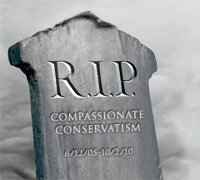Civil and Religious Law in England: Contra Canterbury!
I have heard Rowan Williams speak and unlike some from this website am fairly well disposed to him- he gave a fascinating talk on art and philosophy at Cambridge in 2005. I suppose that makes me a perfect advocate of the argument that today the Archbishop has made a complete idiot of himself. Partly he has made an idiot of himself through the fact that whatever Rowan Williams does understand, the media isn’t one of the things that he gets. Partly though he has made an idiot of himself because he has advocated a concept of law which I think is dangerous and creates a special privilege for established Churches in this country which they should not have.
Williams’s speech has usefully been put up on the Guardian website. Reading it one notices a couple of things. Williams is not really talking about Sharia – the discussion of Sharia is just a bridge into a much more important theoretical issue which is the attitude of the law to the citizens who live under it.
What Williams wants the law to do is to distinguish between citizens based on what they believe: he tells us that
there is a risk of assuming that ‘mainstream’ jurisprudence should routinely and unquestioningly bypass the variety of ways in which actions are as a matter of fact understood by agents in the light of the diverse sorts of communal belonging they are involved in.
Williams of course over emphasizes the communal (and Matt Sinclair has criticised the Archbishop adequately on those grounds here): but he also mistakes what the law is about.
The law is the instrument by which we maintain peace and mark out civil goods and bads: it delineates that which the country considers private and inoffensive and that which the country considers public and dangerous. The law insofar as it does that cannot respect the will of the particular agents who operate under it, even if they have a sense of ‘communal belonging’ which say excuses murder: the question before lawyers is what did they do and what is the punishment. In some situations the law also arbitrates and here you could argue that the intentions of the agents matter- but that is only in the sense that the law intends to respect both of the agents. The sense of the agents is not what governs the process of arbitration but its a factor in it. For example, say I am someone who believes that animals are equivalent to children: the fact that I believe that is a factor in the decisions the court might make, but it does not govern those decisions. Williams is right that the law should not be blind to the intentions of agents as factors in any decision, but it should not be governed by those intentions (and he knows it shouldn’t- at one key moment he qualifies his own position to exclude the religious courts ever destroying someone’s rights- quite how he would do that when almost all law concerns questions of right is a different and interesting matter). Ultimately the standerd to which the law aspires is not Muslim, Christian or Jewish justice or Mormon or Scientologist justice but its justice as defined by statute and precedent within Parliament- justice as it applies to everyone who is any of those five religions and to anyone who isn’t from the Sikh to the Satanist, from the atheist to the polytheist.
The problem with Rowan Williams is in part that he is deceived by his own subtlety- go and read the lecture it is an example of encasing yourself in sentences like a mummy in wallpaper and then trying to walk through a crowded tube platform. But its more than that. As a theologian Williams wants us to think about revelation all the time: but revelation doesn’t have that much to do with politics. In a democratic secular state, revelation is a factor in any decision but it doesn’t govern what the government should or shouldn’t do. Ultimately people who believe owe just as much as people who don’t to the state because the state is not a religious formation- it is on its Western model a secular foundation which exists to perpetuate the well being of its members. The point isn’t that religious people can’t be religious, or can’t be members of society, but that the state isn’t interested in their religion. They can use religious justifications for their political actions if they like- but those justifications will only appeal to those that share the same religion and will irritate those that don’t- they will produce communities struggling against each other. The state is a minimalistic project in the sense that it talks a minimalistic language of politics- the problem with Dr Williams is that for him that just isn’t enough.
Its a common problem that you can see here and across the Atlantic- the current Pope is another person guilty of demanding accomodation on his own terms alone. But what people need to realise is that as soon as you create a legally privileged religion or argue that all argument has to take place in religious terms: you do abandon the whole idea of a secular state- a meeting place between people of different religions and none which does not proscribe any faith but tolerates almost all. There is a lot of modern work been done on these questions- Mark Lilla has just published an interesting book I mean to write about here in the future on the philosophy of this area. But ultimately it all comes down to the reasoning of the earliest modern philosopher of secularism, Thomas Hobbes. Hobbes had a dark vision of where arguments like the Archbishop’s could lead us: towards a hell of civil strife and communal violence, towards religious tyranny and massive unhappiness.
Despite my admiration for Rowan Williams, who is a very intelligent and thoughtful person, this time I’m with Thomas Hobbes.
-------------------------
| Tweet |
'Gracchi' is a regular contributor to Liberal Conspiracy. He started a blog last year which deals with culture and politics and history, where his interest lies. He is fascinated by all sorts of things including good films and books and undogmatic discussion of ideas. This seems like a good place to do the latter... Also at: Westminister Wisdom
· Other posts by Gracchi
Filed under
Blog
12 responses in total ||
It is not the job of a Christian Archbishop – or of any Christian – to advance the claims and practices of Islam. A devout Christian’s duty towards Muslims is to convert them to the true faith. Rowan Williams is not cut out to be a bishop. He is too subtle by half.
It’s also quite clear from this lecture that, not for the first time, he is more focussed on making common cause with Muslims in carving out a greater public space for religion in Britain – already over-privileged – than in safeguarding a liberal democratic state with an equal playing field for all, religious and non-religious alike. When the chips are down, rival other-worldly religions always unite to attack their common enemy – this-worldly secularism and unbelief. Liberals should be on their guard.
“It is not the job of a Christian Archbishop – or of any Christian – to advance the claims and practices of Islam.”
He isn’t. What he is doing is trying to advance the claims and practices, or at least ideas, of a legal theorist who advocates changing the legal system to accomodate multiple overlapping jurisdictions selected by personal preference in a kind of market, and I’m not sure it’s his job to do that, particularly. Can we stop the ‘Islam’ stuff, please, and read what he said?
I’m afraid this is yet another case of Williams advancing the spurious claim that ‘we can be all pals together in the Abrahamic club’.
In this case, Islam is a factor, not because Williams’ argument presage the idea of Saudi style Sharia law in the UK, as the idiots in the tabloids are suggesting – although one has to wonder if his suggestion might not have gone down a little better had he indicated that he had Derek Conway in mind when making his remarks – but because a very important difference between Islam and Christianity on the question of the relationship with secular and religious law.
Islam lacks any doctrinal concept of a separation of religion and state, unlike Christian which can rest on Jesus’ comment about rendering unto Caesar, blah, blah, as a basis for taking the view that spiritual and temporal authority have different but equally valid foundations within their own domains. In Islam, there is no parallel scriptural reference and no basis, therefore, on which to found a view that church and state are separate and distinct entities, they are one and the same and their authority derives directly from Allah.
Williams’ suggestion that a form of Sharia court, of limited scope, could function within the English law is perfectly feasible in terms of English law, the common law allows for financial disputes to be settled by third party binding arbitration provided both parties agree to the process and so far as marriage is concerned, although the process for the civil/legal severance of a marriage is a matter of statute, the law takes no view whatsoever on the matter of whether a particular religion chooses to recognise the validity of a marriage or divorce within its own doctrinal conception of the terms.
What is more problematic is that this idea does not fit well with Islam and Islamic law. Generally, if a Muslim is liberal in his/her outlook then they are unlikely to have any great desire to make use of an informal Sharia court whereas those Muslims who would prefer to see such courts will tend to be doctrinally conservative and, at least, dismissive of such arrangements – at the extreme fringes a Sharia court constituted on such a basis might easily be considered heretical.
There are also ‘process’ issues that could create problems – although the limited courts operating within Anglicanism, Catholicism and Orthodox Judaism are religious courts they do subscribe to and apply broadly the same basic standards as an English civil court in terms of process, the requirement for evidence and standards to proof.
This is not necessarily the case in a Sharia court, where evidence of religious belief can be a much greater factor; decisions can easily be rendered not on the basis of evidence of the merits of the case but on evidence of the piety and devout character of a plaintiff/defendant.
Whatever Williams may think, it is not so easy a fit between English secular law and Sharia law, even in the very limited form that Williams advocates, as it is between secular law and Anglican Canon law.
A couple of linked thoughts.
Williams is making the case that only “proper” religions should be given consideration – “a recognised means of deciding the relative seriousness of conscience-related claims, a way of distinguishing purely cultural habits from seriously-rooted matters of faith and discipline, and distinguishing uninformed prejudice from religious prescription”. Big Religion, in other words. A legitimate authority to decide authoritatively whether, for example, Anglicans think that homosexuality is vile and the law should take that into account when deciding on the motives of an Anglican. Well, that ought to be easy enough to decide, oughtn’t it?
Secondly, he’s doing that old “it isn’t part of the religion, it’s cultural” dance, even in cases where he admits some of the things people object to are part of the religion. So where does that leave his authorities? If a “cultural” practice is so ingrained in the culture that any religious authority would treat it as being part of the religion, then it is part of that religion. The only people who would say universal cultural practices are not part of the religion and attempt to separate them are the sort of puritan fundamentalists his church has resisted vigorously for several hundred years. What he’s actually doing here is claiming that there can be an authority external to a religious community which can decide whether a particular practice or belief is “religious” (worthy of being taken into account in lawmaking) or “cultural” (unworthy).
When I first heard it my first thought was that he is laying a poisoned apple. If he can somehow stoke the fire between muslims and those that believe in one law for all, and this debate really takes shape…he can then come back later when the case is being made more for Sharia law and start claiming that if they get their own law, Christians should be able to divert on current law too, given how it has been slowly diverged from the teachings.
But maybe I’m looking too much in to it.
I think he’s very, very confused. But his motivation is clear and it’s the same as that of the Sharia enthusiasts and the RC church’s recent stance on gay adoption – it’s an attempt to redraw the limits of the secular state to give more power to religious institutions – and it’s the institutions part of that which is important. A random homophobe doesn’t get to decide that his conscience says he ought to be allowed to discriminate against gays, but if Cardinal Murphy-O’Connor says that’s an essential part of the Catholic conscience, that’s different because he’s A Very Important Religious Leader.
It’s basically borne out of frustration because Williams feels nobody’s giving him the respect he thinks he deserves. An irrelevant buffoon leading an institution which is fading away.
Sympathetic as I am towards Rowan, who has talked a lot of sense about a lot of issues (albeit not very recently), this time I have to agree he really has ballsed up. I can sort of see where he is coming from, but the proposal doesn’t survive under any scrutiny in any aspect.
It’s been a few years since I used to go to church, and thinking about religious law made me think of what would happen at our church. They were a nice bunch of decent people, but the idea of having judgement passed over by the elders on various matters is pretty frightening to say the least. It would be like the Magistrates court, but without the clerk to advise them.
The English legal system may seem pretty arbitrary (and I know, I work with it), but it is built on sound principles, and is one of the fairest systems in the world. Because of its aloof and arbitrary nature, I think people can be forgiven for not having much faith in it. It’s not perfect, but 800 odd years of practice on it’s own says something of its strength. And the church has been integral to this system – the colleges lawyers were trained at were owned and run by the church for many centuries.
Andrew, I agree with you. What this is all about, it seems to me, is a deliberate, and possibly concerted, attempt to notch up the power of religious institutions at the expense of the secular state. Religious people – whether Jewish, Christian, or Muslim – cannot bear the thought that their “sacred” insights which they believe have been purveyed to them by Jehovah, God, Allah,or whatever aren’t allowed to trump the painfully arrived at secular arrangements of a modern society designed to create a level playing field.
This Archbishop is bending over backwards to keep the homophobic African Christians within the C of E, and it’s increasingly obvious that he will happily play even the Muslim card if it assists him to do so.
It is increasingly looking as if, despite the historic [mostly Nonconformist] roots of liberalism and Christian socialism, religion and democratic liberal values make uneasy bedfellows in the 21st century.
Andrew,
Thanks for giving some clarity to views that have been , frankly, a bit foggy for me. I subscribe completely to what you are saying in your first paragraph.
Unfortunately, I do not think that we can write off the attacks on secular politics quite as easily as you do in your second paragraph. There are always those that wish to defer to some higher authority.
How many? I have no idea.
Frankly, given that I’m an atheist I couldn’t care less what subtle theological-legal concepts the Archbishop was putting forward, so long as they don’t suggest that religions can enforce their will on non-believers. The real issue here is his stunning incompetence and naivety here in dealing with the media.
He seems to have become so consumed with admiration for the subtlety and innovation of his own thinking (which seems in this case mightily difficult to follow) that he lost sight of the basic fact that in this country mentioning sharia law in a positive light will obviously make anything you actually said instantly irrelevant – especially given how incomprehensible what he said actually was.
If he really wants to advocate Shari’a courts on the same level as Christian or Jewish courts, an idea which I suppose is not terrible as some, he’d be well advised to pick his words with extreme caution and to be extremely clear about what he’s saying, rather than burying it in a very confusing and lengthy speech.
What, unfortunately, he’s done is completely unnecessarily given the tabloids an almost unrivalled chance to incite hatred against Muslims, by giving a previously unthinkable level of support to the tabloid conspiracy theory that everyone’s lives will soon be ruled by some ultra-violent Islamic dictator, flanked by subservient flunkeys like the Archbishop.
Sure, the blame for this should squarely lie at the feet of the tabloid editors, who seem from the comfort of their air conditioned Canary Wharf offices to be quite happy to risk plunging half of northern England into inter-racial violence, all in exchange for a little extra circulation this or that week. I note that the Sun’s editorial, disgracefully, described him as “cosying up to Islam”, which clearly shows how far the paper’s stance has gone now – Muslim immigrants are now quite explicitly painted as the enemy of Britons, and those who “cosy up” to them can be implied to be traitors without it even needing to be said.
But for all that, someone in the Archbishop’s position should really know better than to walk into this wide open and well signposted trap. I expect it’ll all blow over in a few days, but if he’s going to take a high profile position in favour of tolerance of Muslim immigrants (something which is desperately needed) I’m saddened that he can’t do it in a more productive manner.
Reactions: Twitter, blogs
-
Smokewriting - Another Fine Edition of Me
[...] thinking at least shows (whatever you think of his tendency to go for both-and over either-or) that he understands that the relation between the universal (law) and particular [...]
-
Rowan Williams and “sharia courts”: reaction in the media and blogosphere « pixelisation
[...] Gracchi, “Civil and Religious Law in England: Contra Canterbury!”: I have heard Rowan Williams speak and unlike some from this website am fairly well disposed to him- … [...]
Sorry, the comment form is closed at this time.
You can read articles through the front page, via Twitter or RSS feed.
» Are the TPA blind to Royalty? (pt 2)
» Why Labour should oppose the Irish bank bailout
» Help clean up Corporate Lobbying in Brussels
» The favourite phrase of those who’ve always had it better
» Race and racism: A white Briton writes
» How the BBC gave free rein to global warming deniers during ‘climategate’
» Apparently Labour factional fighting is back. Or not
» The real problem is Rupert Murdoch, not Andy Coulson
» How the government could build one million homes
» Labour and the unions: the Blairites are back
» What’s the price we pay for smashing windows?
|
25 Comments 56 Comments 28 Comments 19 Comments 18 Comments 58 Comments 50 Comments 36 Comments 35 Comments 35 Comments |
LATEST COMMENTS » Ted posted on Are the TPA blind to Royalty? (pt 2) » margin4error posted on Why Labour should oppose the Irish bank bailout » jennifer roberts posted on Poll shows Left winning argument on economy » Christpher Popham Smith posted on Poll shows Left winning argument on economy » Slumcat posted on How the government could build one million homes » paulstpancras posted on Poll shows Left winning argument on economy » Slumcat posted on Even Tories admit to London social cleansing » Paulo Coimbra posted on Why Labour should oppose the Irish bank bailout » bluepillnation posted on Race and racism: A white Briton writes » Slumcat posted on Even Tories admit to London social cleansing » Pucci Dellanno posted on Race and racism: A white Briton writes » Pucci Dellanno posted on #NeverHadItSoGood Tory resigns » Graham posted on Are the TPA blind to Royalty? (pt 2) » ahmet posted on Why Labour should oppose the Irish bank bailout » ahmet posted on Why Labour should oppose the Irish bank bailout |















